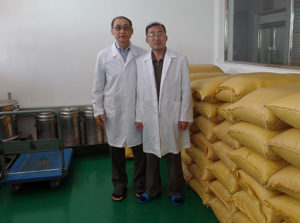Chilly relations between the United States and North Korea appear to be “thawing” in recent days, said Baptist minister Yoo Yoon of Dallas, who has supervised delivery of food for orphans and hospital patients in the communist nation more than 20 years. However, when he journeyed to North Korea last month, he experienced greater restrictions on his travel inside the country than in the past.
When Yoon, director of the Korean-American Sharing Movement of Dallas, traveled to North Korea April 14-21, he was told he was just the third Korean-American to receive validation to enter the nation since the U.S. State Department implemented a travel restriction last year.
Last August, Texas Baptist Men sent a letter to the State Department to request a special passport validation to allow Yoon to continue this humanitarian work in North Korea, providing food to a hospital and schools for orphans in Kwangwon Province.
“These five orphan schools and the province hospital rely heavily on the relief from TBM for food supplies,” the letter stated. “Most people in the province know that American Christians, especially Baptists, provide these food supplies.
“Without TBM’s help, more than 2,500 orphans and 500 hospital patients would greatly suffer from malnutrition. This situation is irreversible, and these children and patients rely heavily on the food provided by Texas Baptist Men.”
When Yoon eventually received the passport validation and made his latest trip to North Korea, he found the officials there “treated me very differently, because they think I am sent by the U.S. State Department,” he said.
“They advised me not to go to any orphanages where I brought the soybeans and corn noodles,” he said.
However, he persisted and eventually was granted permission to visit three orphan schools in Wonsan City, capital of Kangwon Province. He was not permitted to visit the province hospital, because it reportedly was under construction.

Yoon learned the ration system had changed, and instead of receiving soybeans, the orphan schools received soy milk and soy crackers. He was allowed to visit the food production facility in Wonsan City where the soybeans are processed.
He also discovered the donated soybeans and corn noodles—which previously had been delivered to five orphan schools and a hospital in one province—had been divided and distributed among three provinces.
Yoon was told the orphan schools in Pyonyang and orphan schools in Hwanghae Buk Province each received 20 tons of soybean products, and the orphan schools in Hwanghae Buk also received 30 tons of corn noodles.
Yoon contacted a counterpart at the North Korea Education Project who agreed to verify delivery and make a full report on the food distribution.
At one of the orphan schools, Yoon delivered a lawn edger he had purchased in China. On an earlier visit, he had seen teachers and staff cutting the grass with scissors.
He also witnessed a band and soccer team using instruments and soccer balls he had delivered on a previous trip.
In spite of limitations on his movement within the country, Yoon was able to present the gospel to the guards assigned to him, and one of them professed faith in Christ.
“Pray for the North Koreans. They suffer beyond imagination,” he said. “God’s time has come for peace in the two Koreas.”















We seek to connect God’s story and God’s people around the world. To learn more about God’s story, click here.
Send comments and feedback to Eric Black, our editor. For comments to be published, please specify “letter to the editor.” Maximum length for publication is 300 words.